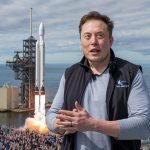Clean Water Revolution: Elon Musk’s Foundation Brings Solar-Powered Pumps to the Navajo Nation
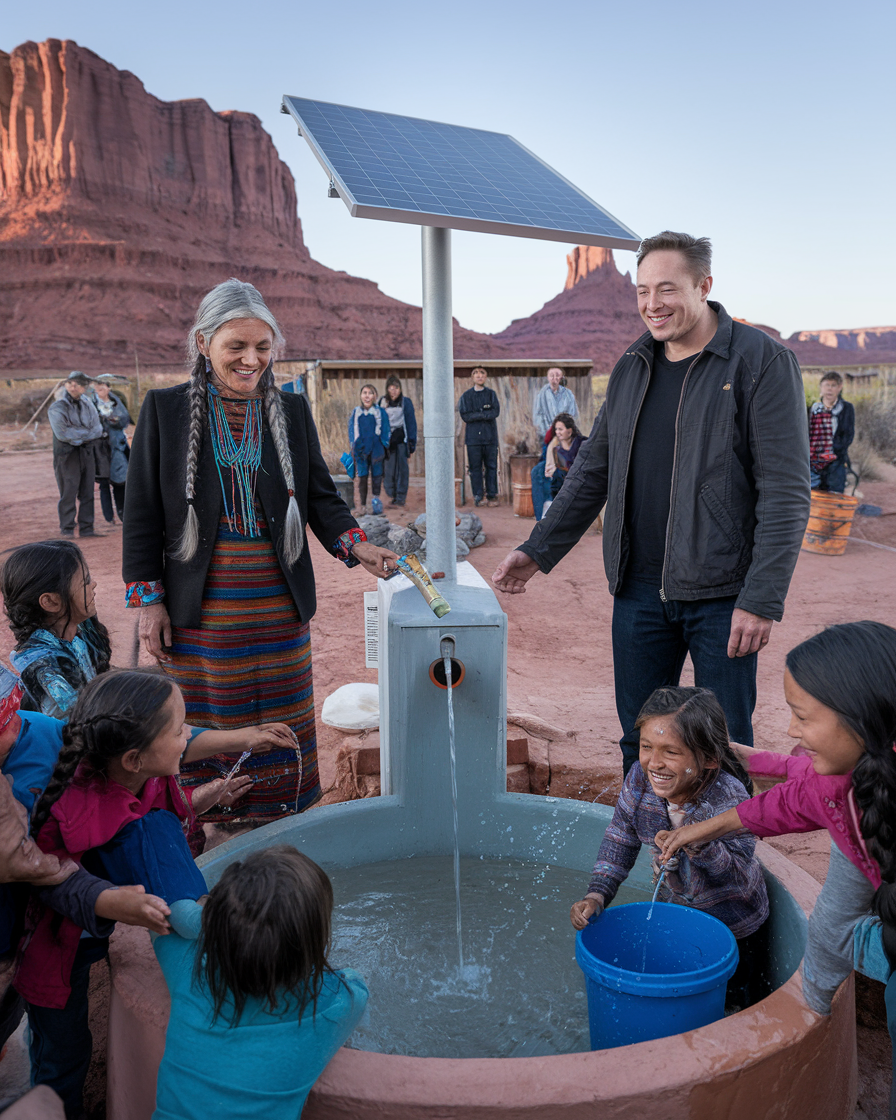
Access to clean water is a fundamental human right, yet for many indigenous communities like the Navajo Nation, it has remained an elusive dream—until now. Thanks to a generous donation from Elon Musk’s foundation, solar-powered water pumps are transforming lives, delivering sustainable solutions, and sparking hope across the Navajo Nation. This groundbreaking initiative not only addresses a pressing need but also sets a powerful example of how innovation and compassion can come together to create a brighter, more sustainable future. In this article, we’ll dive deep into the significance of this project, its impact on Navajo families, and why clean water matters more than ever.
The Navajo Nation’s Water Crisis: A Long-Standing Challenge
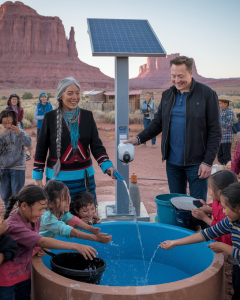
For decades, the Navajo Nation—a vast indigenous territory spanning parts of Arizona, Utah, and New Mexico—has grappled with a severe water crisis. Despite being one of the largest Native American tribes in the United States, many Navajo families have lacked consistent access to clean, safe drinking water. According to estimates, approximately 30% of households on the reservation do not have running water, forcing residents to travel long distances to haul water or rely on contaminated sources.
This lack of infrastructure isn’t just an inconvenience; it’s a public health crisis. Contaminated water sources have been linked to illnesses, while the physical burden of transporting water takes a toll on families, particularly the elderly and children. The issue is compounded by the region’s arid climate and limited resources, making traditional water delivery systems expensive and impractical. For years, advocates have called for solutions, but progress has been slow—until Elon Musk’s foundation stepped in with a game-changing contribution.
Elon Musk’s Foundation: A Beacon of Hope

Elon Musk, the visionary entrepreneur behind Tesla, SpaceX, and xAI, is no stranger to tackling big problems with innovative solutions. Through his foundation, Musk has made it a mission to support causes that align with his belief in sustainability and human progress. The donation of solar-powered water pumps to the Navajo Nation is a perfect embodiment of this ethos, blending cutting-edge technology with a commitment to improving lives.
The Musk Foundation’s involvement didn’t happen overnight. It came as a response to growing awareness of the Navajo Nation’s plight, amplified by grassroots campaigns and social media movements like #WaterForAll. By providing solar-powered water pumps, the foundation is addressing two critical needs at once: access to clean water and sustainable energy. These pumps harness the abundant sunlight of the Southwest to power water extraction and purification systems, offering a reliable, eco-friendly alternative to diesel generators or grid-dependent solutions.
How Solar-Powered Water Pumps Work

At the heart of this initiative are the solar-powered water pumps—ingenious devices that combine renewable energy with practical engineering. But how do they work? Simply put, these pumps use solar panels to capture sunlight and convert it into electricity. This energy then powers a pump that draws water from underground aquifers or nearby sources, filters it for safety, and delivers it to homes or community distribution points.
What makes this technology so revolutionary for the Navajo Nation? For one, it’s low-maintenance and cost-effective. Unlike traditional systems that require fuel or extensive electrical infrastructure, solar pumps rely on a resource the region has in abundance: sunshine. They’re also scalable, meaning they can be deployed in remote areas where conventional water systems would be impractical. Most importantly, they provide clean, safe water without adding to the carbon footprint—a win for both people and the planet.
The Impact on Navajo Families

The arrival of solar-powered water pumps has brought tangible joy and relief to Navajo families. Imagine the difference it makes to wake up each morning knowing that clean water is just a tap away—no more hours spent driving to a distant well or worrying about contamination. For parents, it means healthier children who can focus on school instead of fetching water. For elders, it’s a reprieve from the physical strain of hauling heavy containers. And for the community as a whole, it’s a step toward dignity and self-sufficiency.
Take, for example, the story of a Navajo grandmother who shared her experience with local media: “Before the pumps, we’d spend half the day getting water, and even then, it wasn’t always safe. Now, my grandkids can drink without me worrying. It’s like a miracle.” Stories like hers are multiplying across the reservation as more pumps are installed, each one a lifeline to a better quality of life.
Beyond the practical benefits, there’s an emotional and cultural resonance to this project. Water holds deep significance in Navajo traditions, often symbolizing life, renewal, and connection to the land. By ensuring its availability, the Musk Foundation’s initiative honors these values while addressing a modern challenge.
Why Clean Water Matters: A Global Perspective
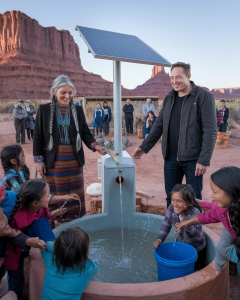
The Navajo Nation’s water crisis is not an isolated issue—it’s part of a broader global challenge. According to the World Health Organization, over 2 billion people worldwide lack access to safely managed drinking water. This scarcity fuels poverty, disease, and inequality, disproportionately affecting marginalized communities like indigenous populations. In the United States alone, Native American reservations face some of the worst water access disparities, a stark reminder of systemic inequities.
Clean water isn’t just about survival; it’s about opportunity. It enables education, economic growth, and health—foundations for any thriving society. By supporting the Navajo Nation, Elon Musk’s foundation is contributing to a larger movement to ensure that #CleanWaterMatters for all, regardless of geography or circumstance.
Sustainability at the Core: A Model for the Future

One of the standout features of this project is its emphasis on sustainability. The use of solar power aligns perfectly with the Navajo Nation’s natural environment and the global push toward renewable energy. Unlike fossil fuel-based systems, these pumps produce zero emissions, preserving the pristine landscapes that are central to Navajo identity. They also reduce reliance on external resources, empowering the community to maintain control over their water supply.
This initiative could serve as a blueprint for other regions facing similar challenges. From rural villages in Africa to drought-stricken areas in Australia, solar-powered water pumps offer a scalable, environmentally friendly solution. By championing this technology, Elon Musk’s foundation is not only helping the Navajo Nation but also paving the way for a #SustainableFuture worldwide.
Community Response and Future Plans

The response from the Navajo Nation has been overwhelmingly positive. Tribal leaders have praised the Musk Foundation for its generosity and forward-thinking approach, with some calling it a turning point in their fight for water equity. Social media has buzzed with gratitude, as hashtags like #ElonMuskGivesBack and #NavajoNation trend alongside photos of smiling families and flowing taps.
But the work isn’t done yet. The initial donation of pumps is just the beginning, with plans to expand the program to reach even more households. Partnerships with local organizations and engineers are underway to ensure proper installation and maintenance, while community training programs are equipping Navajo residents to manage the systems themselves. This collaborative approach ensures that the benefits will last for generations.
Elon Musk’s Broader Legacy of Giving Back

This isn’t the first time Elon Musk has used his wealth and influence for good. From funding renewable energy projects to supporting education initiatives, his foundation has a track record of tackling pressing issues with bold ideas. The Navajo Nation project is a natural extension of this legacy, blending Musk’s passion for technology with a commitment to humanitarian impact.
Critics might argue that such efforts are a drop in the bucket compared to Musk’s vast fortune, but supporters see it differently. Each project, like the solar-powered pumps, demonstrates what’s possible when innovation meets empathy. It’s a reminder that even the busiest billionaire can make time to #GiveBack in meaningful ways.
How You Can Support the Cause
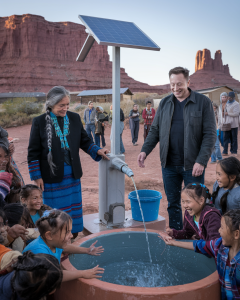
The Navajo Nation’s water revolution is inspiring, but it’s only one piece of a larger puzzle. If this story moves you, there are ways to get involved. Donations to organizations like DigDeep or the Navajo Water Project can fund additional water systems. Sharing posts with hashtags like #WaterForAll and #CleanWaterMatters can raise awareness. And advocating for policy changes to address water access disparities can create systemic change.
Together, we can amplify the impact of efforts like the Musk Foundation’s, ensuring that clean water flows not just for the Navajo Nation, but for every community in need.
Conclusion: A Ripple Effect of Change
Elon Musk’s foundation has done more than just donate solar-powered water pumps—they’ve ignited a movement. For the Navajo Nation, this initiative means clean water, healthier lives, and a renewed sense of hope. For the world, it’s a powerful example of how technology and generosity can address even the most stubborn challenges. As the pumps hum under the desert sun, they’re not just delivering water—they’re delivering a promise of a better tomorrow. Let’s celebrate this milestone and commit to building a future where #CleanWaterMatters for all.











